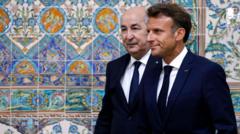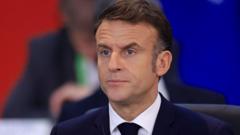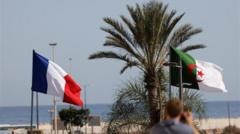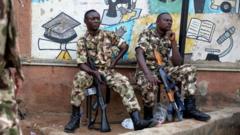The latest turn in Franco-Algerian relations follows the arrest of an Algerian consular official in France, prompting a series of retaliatory measures from both governments.
Diplomatic Tensions Rise as France and Algeria Engage in Expulsive Response

Diplomatic Tensions Rise as France and Algeria Engage in Expulsive Response
A diplomatic spat between France and Algeria has escalated with mutual expulsions of diplomats, highlighting the fragile relationship between the two nations.
France has recalled its ambassador to Algeria amid a mounting diplomatic crisis marked by expulsion orders exchanged between the two nations. France's decision to remove 12 Algerian diplomats comes after Algeria expelled 12 French officials in response to the arrest of an Algerian consular employee linked to the kidnapping of an outspoken critic, Amir DZ. This incident has intensified a longstanding conflict that observers describe as the most severe strain in relations since Algeria gained independence from France in 1962.
The diplomatic tensions escalated last Friday when French authorities arrested the consular official along with two accomplices tied to Amir DZ’s abduction. Algerian officials condemned the arrest as an act of provocation aimed at "humiliating" the nation. Algerian Secretary of State Sofiane Chaib blamed French Interior Minister Bruno Retailleau for instigating the current crisis and called the accusations tied to the arrest "grotesque."
Conversely, Retailleau stated such situations arise due to Algeria not adhering to its obligations regarding the expulsion of individuals deemed dangerous by France. This controversy is rooted in deeper issues, including disagreements over territorial sovereignty in Western Sahara and renewed animosities linked to a powerful Algerian novelist's imprisonment for critical remarks about the country’s borders.
French Foreign Minister Jean-Noël Barrot characterized Algeria's actions as unnecessary escalation and expressed regret for the worsening relationship, while emphasizing the need for calm dialogue in the future. Both nations displayed reluctance to deescalate, despite prior attempts at engagement by French officials in recent weeks, ultimately leading to the breakdown of a tentative thaw in relations.
Barrot acknowledged that negotiations would need to continue eventually, despite the current hostilities, signaling that the diplomatic freeze may not be sustainable for long-term interests.
This ongoing standoff exemplifies the complex geopolitical tensions between historical adversaries, underscoring the challenges both nations face in navigating their intertwined legacies while attempting to foster a future of mutual respect.
The diplomatic tensions escalated last Friday when French authorities arrested the consular official along with two accomplices tied to Amir DZ’s abduction. Algerian officials condemned the arrest as an act of provocation aimed at "humiliating" the nation. Algerian Secretary of State Sofiane Chaib blamed French Interior Minister Bruno Retailleau for instigating the current crisis and called the accusations tied to the arrest "grotesque."
Conversely, Retailleau stated such situations arise due to Algeria not adhering to its obligations regarding the expulsion of individuals deemed dangerous by France. This controversy is rooted in deeper issues, including disagreements over territorial sovereignty in Western Sahara and renewed animosities linked to a powerful Algerian novelist's imprisonment for critical remarks about the country’s borders.
French Foreign Minister Jean-Noël Barrot characterized Algeria's actions as unnecessary escalation and expressed regret for the worsening relationship, while emphasizing the need for calm dialogue in the future. Both nations displayed reluctance to deescalate, despite prior attempts at engagement by French officials in recent weeks, ultimately leading to the breakdown of a tentative thaw in relations.
Barrot acknowledged that negotiations would need to continue eventually, despite the current hostilities, signaling that the diplomatic freeze may not be sustainable for long-term interests.
This ongoing standoff exemplifies the complex geopolitical tensions between historical adversaries, underscoring the challenges both nations face in navigating their intertwined legacies while attempting to foster a future of mutual respect.



















